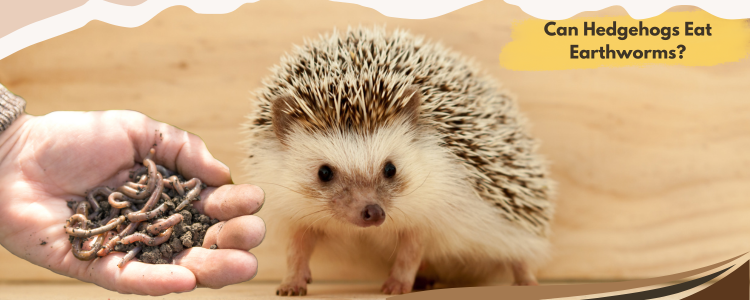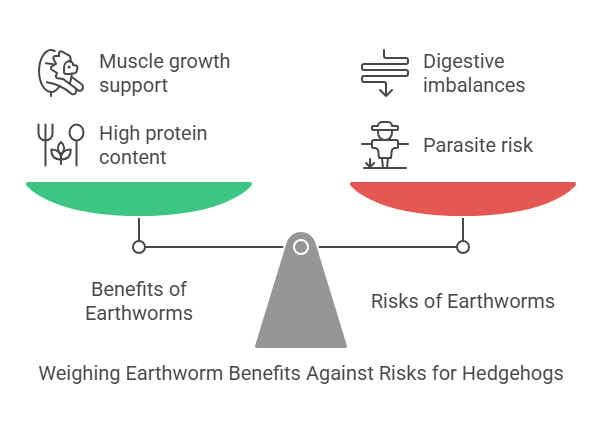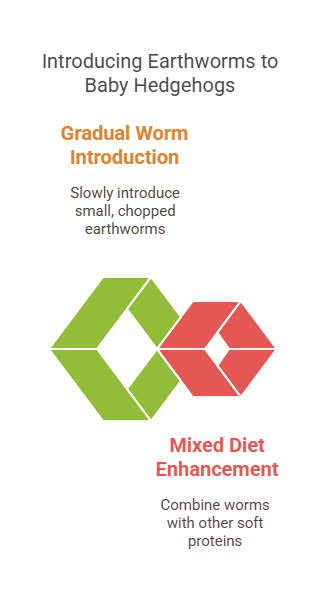Yes, hedgehogs can eat earthworms! In fact, earthworms are a natural part of a hedgehog’s diet. Hedgehogs are omnivores, and they consume a variety of insects and invertebrates, including earthworms, beetles, slugs, and caterpillars. Earthworms provide essential nutrients, such as protein and calcium, which are important for a hedgehog’s health.
According to the British Hedgehog Preservation Society,
Over 70% of hedgehogs consume insects and worms in the wild. Studies have shown that hedgehogs with access to a varied diet live healthier and longer lives.
Do Hedgehogs Eat Earthworms in the Wild?
Yes! Hedgehogs are natural insectivores. In the wild, they munch on a variety of insects, worms, and small creatures. Earthworms are a regular part of their diet, providing essential nutrients. Their keen sense of smell helps them locate worms underground, making them a staple in their natural menu.
Are Earthworms Safe for Hedgehogs?
Earthworms are generally safe. They are packed with protein, which supports muscle growth and energy. However, not all worms are equal. Some carry parasites, which can harm hedgehogs. A diet too rich in worms may also cause imbalances in their digestive system, leading to loose stool or nutritional deficiencies if not complemented with other foods.
Nutritional Benefits of Earthworms for Hedgehogs
Earthworms contain essential nutrients:
- Protein: Supports growth and energy.
- Calcium: Strengthens bones.
- Iron: Helps blood circulation.
- Omega-3 Fatty Acids: Boosts immune function.
- Moisture: Hydrates the hedgehog naturally.
Dr. Sarah Wilkinson, a wildlife expert, states, “Earthworms are a great natural food source but should be sourced responsibly to avoid health risks.” Source
Risks of Feeding Earthworms to Hedgehogs
While nutritious, earthworms can pose some risks:
- Parasites: Wild-caught worms may carry internal parasites.
- Pesticides: Worms from contaminated soil can harm hedgehogs.
- Choking Hazard: Large worms may be difficult to swallow.
- Unbalanced Diet: Too many worms can lead to nutritional deficiencies if not part of a balanced diet.
How to Safely Feed Earthworms to Hedgehogs
To minimize risks, follow these steps:
- Use store-bought worms. These are parasite-free.
- Wash worms before feeding. This removes dirt and potential chemicals.
- Cut large worms into smaller pieces. This prevents choking.
- Feed in moderation. Too many can cause digestive issues.
- Observe after feeding. Check for signs of discomfort or allergies.
How Often Can Hedgehogs Eat Earthworms?
Moderation is key. A few worms per week are enough. Hedgehogs need a balanced diet, including:
- High-quality hedgehog food
- Cooked chicken (unseasoned)
- Mealworms and crickets (occasionally)
- Fresh fruits and vegetables
Can Baby Hedgehogs Eat Earthworms?
Baby hedgehogs (hoglets) have sensitive stomachs. While they can eat earthworms, they should start with softer foods. Small, chopped worms can be introduced gradually. Mixing worms with other soft proteins like scrambled eggs or cooked poultry ensures a balanced diet.
What Type of Earthworms Are Best for Hedgehogs?
Not all worms are safe. Choose:
- Red wigglers: Safe and nutritious.
- Nightcrawlers: Rich in protein.
- Avoid glow worms and wild worms: They may be toxic.
- European nightcrawlers: A good alternative for high protein intake.
Alternative Protein Sources for Hedgehogs
Besides earthworms, hedgehogs can eat:
- Boiled eggs: Great protein source without harmful additives.
- Cooked turkey or chicken: Soft and easy to digest.
- Insect-based foods: Crickets and mealworms add variety.
- Cottage cheese (occasionally): Provides calcium.
FAQs
1. Can hedgehogs eat worms every day?
No. Too many worms can cause imbalances in their diet. A few per week is best.
2. Are dried worms safe for hedgehogs?
Dried worms lack moisture and can cause digestive issues. Fresh worms are better.
3. What happens if my hedgehog eats a wild worm?
Wild worms may carry parasites. Watch for signs of illness and consult a vet.
4. Can worms replace hedgehog food?
No. Hedgehogs need a balanced diet with various protein sources.
5. How can I tell if my hedgehog likes earthworms?
They may sniff, nibble, or ignore them. Each hedgehog has different preferences.
6. What are the signs of a hedgehog eating too many worms?
Loose stool, reduced appetite for other foods, and lethargy can be signs of overconsumption. Reduce the number of worms and diversify their diet.
7. Are earthworms better than mealworms for hedgehogs?
Yes. Earthworms have a better nutrient profile with lower fat content, making them a healthier option compared to mealworms.
8. Can I breed earthworms at home for my hedgehog?
Yes. Setting up a small worm farm ensures a clean, safe supply for your pet. Make sure the worms are fed organic material and are free from contaminants.
Hedgehogs can eat earthworms, but safety matters. Choose clean, parasite-free worms and feed them in moderation. A varied diet ensures a happy, healthy pet. By following best practices, hedgehog owners can provide a balanced, nutritious meal plan that mimics their natural diet, promoting overall well-being.



